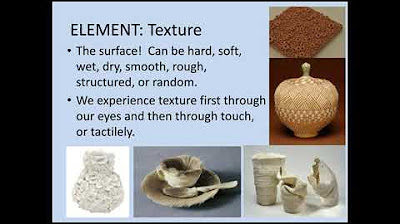Elements of Art
Summary
TLDRThis video script explores the fundamental elements of art, highlighting six key components: line, shape, space, value, color, and texture. It explains how each element contributes to the creation of art, from the initial mark made by an artist to the depth and emotion added by color and texture. The script encourages viewers to recognize these elements in their own artwork and in various forms of art, emphasizing their collaborative role in the artistic process.
Takeaways
- 🎨 Art is composed of six fundamental elements that work together to create a cohesive piece.
- 📝 The first element of art is 'line', which is defined as a path of a moving point.
- 🔍 'Shape' is the second element, allowing artists to separate objects from their backgrounds and is created by defining areas.
- 🌌 'Space' is the third element, adding depth to artworks by specifying areas like foreground, middle-ground, and background.
- 💡 'Value', the fourth element, refers to the light and dark in an artwork, helping to mold flat shapes into 3D forms and define space.
- 🌈 'Color' is the most expressive element, influencing the emotional impact of art and is a result of how we see light reflected from surfaces.
- 👁️ 'Texture' is the sixth element, giving a sense of feel to surfaces and can be implied through techniques like shading and patterns.
- 🤔 The script encourages viewers to train themselves to see the shapes and forms in their surroundings.
- 🎼 Just as seven notes make all music, the six elements of art are the building blocks of all artistic creations.
- 👩🎨 Learning color theory is essential for artists to understand how to mix colors and use them effectively as a visual tool.
- 🖌️ Adding texture to artwork makes it more engaging, interesting, and complete by creating an illusion of tactile qualities.
- 🔍 The script challenges viewers to examine their own artwork to identify the elements of art they may have unknowingly used.
Q & A
What is the first element of art mentioned in the script?
-The first element of art mentioned in the script is 'line', which is a path of a moving point.
What is the purpose of the element 'line' in art?
-The element 'line' helps to define areas, separate objects from their backgrounds, and is the first mark made in any artwork.
What is the term used for defined areas in art?
-Defined areas in art are called 'shapes' or 'forms'.
How does the element 'space' contribute to an artwork?
-The element 'space' is responsible for adding depth to the artwork, allowing the artist to specify foreground, middle-ground, and background.
What is the role of 'value' in an artwork?
-Value, which is the amount of light and dark in an artwork, helps to mold flat shapes into 3D forms, define background versus foreground, and add a sense of space.
What is the most expressive element of art according to the script?
-Color is considered the most expressive element of art, as it can evoke emotions and help express thoughts and ideas at different levels.
How does the script describe the concept of 'color'?
-The script describes color as the way we see light reflected from a surface, and it suggests that learning color theory can help with choosing the right color combinations.
What is 'texture' in the context of art?
-Texture refers to the feel of a surface when touched, and in art, it can be either actual or implied, creating an illusion of a texture through shading, colors, and values.
How does adding texture to an artwork affect its engagement?
-Adding texture makes an artwork more engaging, interesting, and complete by working with shading techniques, colors, values, patterns, and different painting approaches.
What is the script's advice for artists regarding the elements of art?
-The script advises artists to look at their own artwork and try to find all the elements of art they used, possibly without even knowing about them.
Are there any specific orders to list the six elements of art?
-No, the script states that there is no specific order to list the six elements of art, as they all work together as a team to support each other.
Outlines

This section is available to paid users only. Please upgrade to access this part.
Upgrade NowMindmap

This section is available to paid users only. Please upgrade to access this part.
Upgrade NowKeywords

This section is available to paid users only. Please upgrade to access this part.
Upgrade NowHighlights

This section is available to paid users only. Please upgrade to access this part.
Upgrade NowTranscripts

This section is available to paid users only. Please upgrade to access this part.
Upgrade NowBrowse More Related Video
5.0 / 5 (0 votes)





